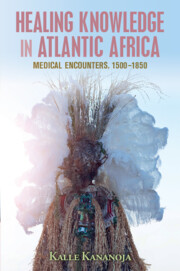Book contents
- Healing Knowledge in Atlantic Africa
- Global Health Histories
- Healing Knowledge in Atlantic Africa
- Copyright page
- Dedication
- Contents
- Figures
- Tables
- Acknowledgements
- Introduction
- 1 Healing (and Harming) Specialists
- 2 Cross-Cultural Experiments
- 3 ‘Much Better Suited Than We Are, as Regards Their Health Care’
- 4 Remedies on the Spot
- 5 Healers, Hospitals and Medicines
- 6 Treating Their Symptoms
- 7 Migrations
- Conclusion
- Book part
- References
- Index
Conclusion
Published online by Cambridge University Press: 08 February 2021
- Healing Knowledge in Atlantic Africa
- Global Health Histories
- Healing Knowledge in Atlantic Africa
- Copyright page
- Dedication
- Contents
- Figures
- Tables
- Acknowledgements
- Introduction
- 1 Healing (and Harming) Specialists
- 2 Cross-Cultural Experiments
- 3 ‘Much Better Suited Than We Are, as Regards Their Health Care’
- 4 Remedies on the Spot
- 5 Healers, Hospitals and Medicines
- 6 Treating Their Symptoms
- 7 Migrations
- Conclusion
- Book part
- References
- Index
Summary
This chapter closes the book by discussing the methodological limits and possibilities in the study of cross-cultural medical encounters in precolonial Africa and the early modern Atlantic world. Maintaining health and well-being was a central concern for peoples of Atlantic Africa and for outsiders who visited or settled in the region from the mid-fifteenth century onwards. From the very beginning, cross-cultural medical interaction was the norm, not the exception, as Africans and Europeans sought to tap different sources of healing knowledge. In general, locals and newcomers were open to experimenting with different curing methods and healing materials originating on different continents, viewing these encounters as opportunities for obtaining new techniques. The mobility of people, knowledge and materials came to characterise the world of healing in the Black Atlantic. The medical pluralism reigning in Atlantic Africa was both a precondition and a product of cross-cultural interaction in medicine. Atlantic African medical culture was open to innovative approaches and novel techniques even without the presence of Europeans, but their arrival only added to this plurality. The low number of European practitioners and their concentration in a few localities on the coast guaranteed that indigenous African medicines and therapies prevailed in the early modern period.
- Type
- Chapter
- Information
- Healing Knowledge in Atlantic AfricaMedical Encounters, 1500–1850, pp. 212 - 217Publisher: Cambridge University PressPrint publication year: 2021

